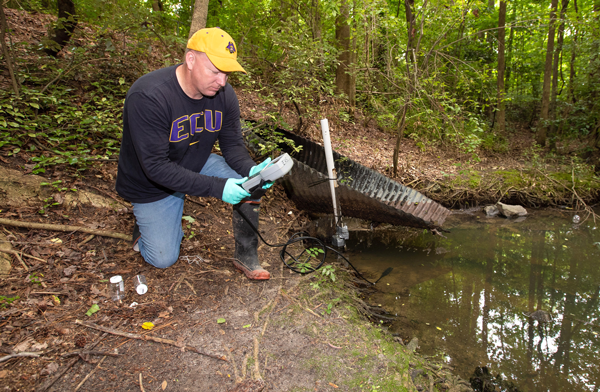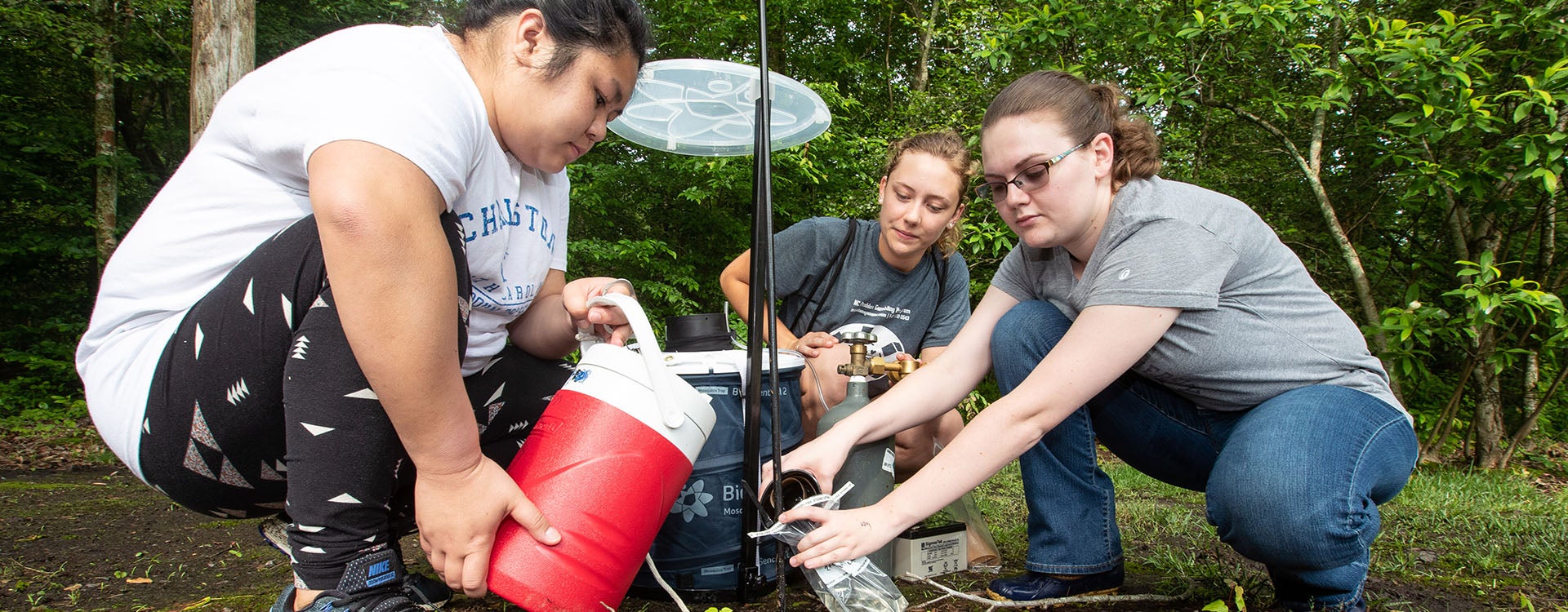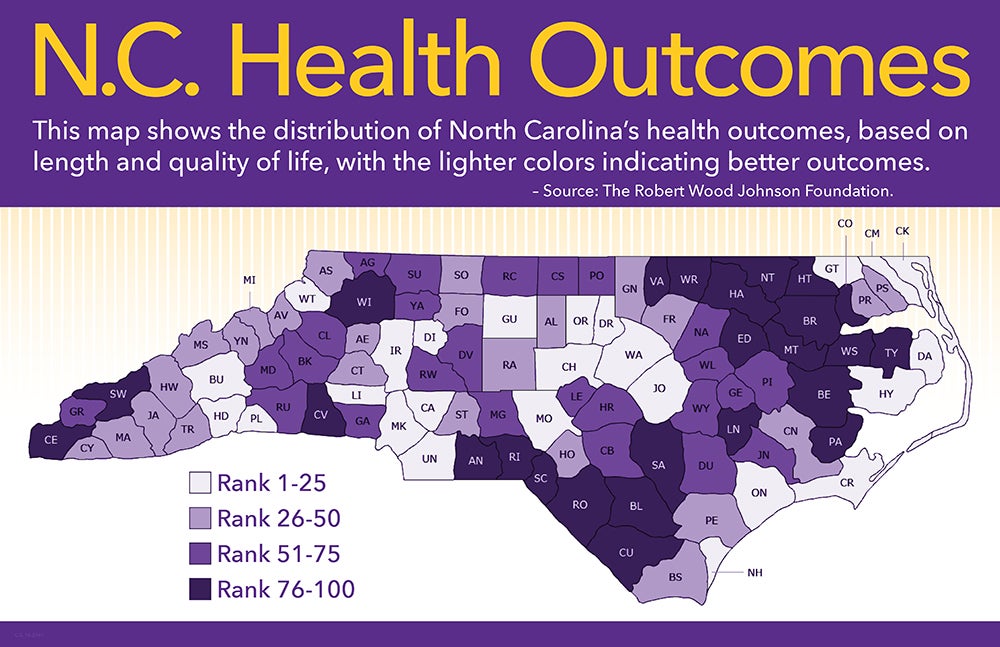EXCELLENCE IN RURAL HEALTH
ECU to establish School of Rural Public Health

ECU associate professor Dr. Charlie Humphrey evaluates the water in drainage pond near Jaycee Park.
East Carolina University has announced plans to establish a new School of Rural Public Health in August of 2020, after the plans were approved by the UNC System Board of Governors’ Committee on Educational Planning, Policies, and Programs last week.
“The approval for the establishment of this new School of Rural Public Health is another example of how our health sciences division continues to pioneer exciting new grounds, as it will be only the second school devoted to public health in the state,” said ECU Chancellor Cecil Staton.
The new school will initially combine departments and centers already in existence at ECU – public health, health education and promotion, biostatistics, health services and information management and the Center for Health Disparities. These departments are currently spread throughout three separate buildings on the university’s two campuses – the Brody School of Medicine, the College of Allied Health Sciences and the College of Health and Human Performance.
“During the past several years, the administration has strategically invested into the programs that will eventually comprise the School of Rural Public Health,” said Dr. Don Chaney, an associate professor and chair for ECU’s Department of Health Education and Promotion. “So a lot of this is taking these pieces we already have in various places and putting them together to better serve the public.”
Kimberly van Noort, the UNC System’s interim senior vice president for academic affairs, said the system was particularly excited about ECU’s new School of Rural Public Health because it fits nicely with the outreach to rural communities and rural students that is part of the Board of Governors’ strategic plan.
“We feel that it’s a very important step by East Carolina University to recognize and to honor both their mission and the needs of the people of their surrounding community that they serve,” van Noort said. “They have long been a leader in public health in the eastern part of North Carolina and indeed serve as the model for the entire state.”
Dr. Phyllis Horns, vice chancellor of ECU’s Division of Health Sciences, said the new school gives ECU a way to renew its commitment to the health of eastern North Carolinians.
“This is the next logical step in ECU being able to meet its mission of service to the people in this region of the state,” Horns said. “We’ll be able to do it in a more concentrated and focused way, by bringing faculty and students together under one roof so they can address those compelling health problems and health disparities in our region.”
Continuing a ‘pattern of excellence’
Dr. Ronny Bell, professor and chair of Brody’s Department of Public Health, said the rural focus of the new school aligns nicely with ECU’s Rural Prosperity Initiative and creates a niche for the university.
“This gives us the opportunity to set ourselves apart from the rest of the programs in the nation, but also align ourselves with the mission of the school,” Bell said. “There has to be a public health workforce that is responsive to the unique issues here in eastern North Carolina, and we feel like ECU is the ideal place to train those individuals.”
The seeds for the new School of Rural Public Health were planted during the late 1990s when planning groups looked at the public health landscape in the state to decide if it made sense for ECU to have its own public health school.
While the consensus was that there was a strong need for a public health presence at ECU, plans for the school could not move forward at that time because ECU had not yet met certain prerequisites, such as a Department of Public Health, a master’s of public health degree and doctoral studies in two different concentrations – all of which have since been implemented. ECU’s first four doctoral students in public health started in spring 2018 with a concentration in health policy, administration and leadership and another concentration in environmental and occupational health.

ECU associate professor Dr. Stephanie Pitts talks with convience store owner David Rizik about the healthy food choices available in his store on Old Pactolus Highway in Pitt County.
During the 2016-2017 school year, ECU granted 46 percent of the UNC system’s public health baccalaureate degrees and 29 percent of the master’s degrees in the field. University officials anticipate the new school will have an enrollment of approximately 1,800 students when it opens based on current enrollment and projected growth.
“ECU was extremely fortunate to have service-minded leaders who recognized nearly two decades ago the compelling need for a public health presence at our university to help address the health challenges of the people in eastern North Carolina, and who were then diligent in working to make that goal a reality,” Staton said.
Dr. John Morrow, director of Pitt County’s Department of Public Health, said that integrating public health with other health care services is “the new frontier of health care.” But he said North Carolina is accustomed to being a leader in health care, starting the nation’s first county health department approximately 100 years ago and continuing to boast some of the world’s best health care opportunities.
“This new School of Rural Public Health continues that pattern of excellence for North Carolina, and East Carolina University is a place where we will be able to see it really flourish,” Morrow said. “We’ve always had this challenge of addressing all the social factors that lead to poor health in rural areas. This is a promise of better things to come for the health of the people of rural North Carolina.”
Many specialties with a common purpose
Dr. Stephanie Pitts, an associate professor in ECU’s Department of Public Health, is a nutritionist who researches access to healthy foods in rural communities and how to best promote healthier food options to the residents and stores in these areas.
Pitts said the synergy of bringing together the programs under the umbrella of a School of Rural Public Health should be helpful in promoting that research and the real-world implications of the findings.
“There are huge disparities in eastern North Carolina in terms of obesity, heart disease, cancer and chronic diseases,” she said. “A lot of that is related to a lack of access to health care, but also a lack of access to resources, like healthy foods and other things that public health can play a role in to help people make healthier choices and also to help increase access to those resources.”
Dr. Charles Humphrey, an associate professor of environmental health sciences, studies the effects of storm water runoff in communities throughout the eastern half of North Carolina.
“We have a lot of water quality issues in this part of the state – nitrogen, phosphorus, bacteria, chemicals from industrial plants and so forth. But most people don’t make that connection between public health and the environment,” Humphrey said.
The new School of Rural Public Health will make it easier for faculty and students from different specialties to collaborate to address these and countless other issues, Humphrey said.
“Having people housed under the same umbrella does encourage people to work together,” he said. “The more we can get good groups of people who have different specialties, but that tie together, I think that will help faculty understand how if we can work together, we can really target multiple aspects of a problem.”

